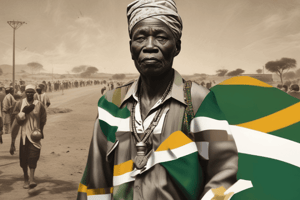Podcast
Questions and Answers
In Africa, youth organizations have emerged as powerful voices advocating for democratic reforms and holding political leaders accountable.
In Africa, youth organizations have emerged as powerful voices advocating for democratic reforms and holding political leaders accountable.
True (A)
Women's participation in politics is equal to that of men in many African countries.
Women's participation in politics is equal to that of men in many African countries.
False (B)
Samia Suluhu Hassan became the first female president of Tanzania in 2020.
Samia Suluhu Hassan became the first female president of Tanzania in 2020.
False (B)
A strong civil society and independent judiciary are key factors in promoting citizen-state relations in Africa.
A strong civil society and independent judiciary are key factors in promoting citizen-state relations in Africa.
Citizens' cultural identity has no impact on their political participation in Africa.
Citizens' cultural identity has no impact on their political participation in Africa.
Flashcards are hidden until you start studying
Study Notes
African Citizens and Democratic Politics
African citizens have played a significant role in the democratic politics of their countries, shaping the political landscape through their cultural identity, participation in elections, youth engagement, women's representation, and citizen-state relations. This article explores these subtopics in the context of African democracies.
Cultural Identity and Political Participation
The end of apartheid in South Africa marked a turning point in African democratic politics. The Freedom Charter, a blueprint for building a new nation, envisioned a society free from apartheid's grip, offering quality housing, education, and economic opportunities for all. This charter's principles have guided the country's democratic journey, with citizens participating in democratic elections and actively engaging in political processes.
Ethnicity and Voting Patterns
Ethnicity is a significant factor in African voting patterns. In some cases, ethnic groups have aligned themselves with political parties or leaders, influencing electoral outcomes. For instance, in South Africa, the African National Congress (ANC) has long been associated with the majority black population, while other parties have historically represented minority groups. These alignments can be complex and multifaceted, with many factors beyond ethnicity influencing voting decisions.
Youth Engagement in Democratic Processes
Young people in Africa are increasingly engaging in democratic processes, challenging the perception that they are apathetic towards politics. In some countries, youth organizations have emerged as powerful voices advocating for democratic reforms and holding political leaders accountable. These youth-led initiatives have contributed to the vibrancy of African democracies and have helped to counter the trend of authoritarianism.
Women's Representation in Governance
Women's representation in African governance has improved in recent years, with many countries making strides towards gender parity. For instance, Samia Suluhu Hassan became the first female president of Tanzania in 2021. However, women's participation in politics remains unequal, with many barriers to entry and limited representation in decision-making positions. Efforts are underway to promote women's political participation and ensure that their voices are heard in the democratic process.
Citizen-state Relations in Africa
Citizen-state relations in Africa are crucial for the sustainability of democratic politics. In countries with strong civil societies and independent judiciaries, citizens have more trust in their governments and are more likely to engage in democratic processes. However, in countries where the relationship between citizens and the state is strained, democratic institutions may weaken, and authoritarianism may gain ground. Maintaining a healthy citizen-state relationship is essential for the long-term success of African democracies.
In conclusion, African citizens are actively participating in democratic politics, shaping their countries' political landscape through their cultural identity, participation in elections, youth engagement, women's representation, and citizen-state relations. Despite challenges, many African countries are making progress towards more representative and accountable governance. As the continent continues to navigate its democratic journey, the role of citizens will remain crucial in ensuring that democratic institutions are robust and responsive to the needs of the people.
Studying That Suits You
Use AI to generate personalized quizzes and flashcards to suit your learning preferences.




